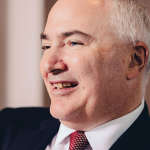Allen & Overy‘s veteran leader David Morley remarked sometimes that in running a law firm, success or failure is less about the decisions you make and more the ability to communicate what you are doing and why. Though directed at his own firm, the observation speaks to much of what ailed Linklaters over the last four years as a chasm opened between its leadership and partnership.
In managing partner Simon Davies and senior partner Robert Elliott, Linklaters had intelligent and energetic leaders intent on taking tough decisions to reposition the firm after the banking crisis. What was forgotten during a series of restructurings was that the partnership needed to be brought along to achieve their purpose. A decision can be absolutely valid but still entirely wrong if you can’t get the majority of your partnership to believe in it, not just grudgingly rubberstamp it.
The hope at Silk Street, with popular head of banking Gideon Moore just confirmed as the new managing partner, is that the City giant can finally move on after that divisive 2011/12 restructuring. While the post-Lehman 2009 cull had been viewed as unpleasant but necessary, the latter shake-up was another matter entirely, cutting deep into the corporate practice. Even some hard-nosed Linklaters veterans looked on aghast.
For years Linklaters had made a virtue of its ruthless, driven management style. At a certain point, however, the need for constant upheaval spoke less to ambition and more of an issue with partnership quality or basic ability to motivate the troops. The mystique was fading.
That Davies failed to initially secure a second term in early 2012 in a contest against no candidates was bad enough. Matters were aggravated when some felt the spirit of the firm’s deed had been stretched in pushing through his ratification at a subsequent partnership conference, further weakening support for Elliott.
The episode ushered in a period in which Linklaters’ c-suite was hamstrung for the rest of its term on any substantive decision. With Linklaters wrestling with an underweight contentious practice, a corporate team striving to reposition itself outside its core plc clients and the firm with the weakest US practice of London’s big four, this deadlock was ill-timed.
Not that it had looked as if it would pan out this way when Davies was elected as managing partner in 2007. Davies was earnest, bright and played with the straightest of bats. On paper it should have worked. As it was, the lack of soft skills mixed with technocratic jargon were never overcome – his enduring image was summed up by one former partner who says the management ‘were constantly driving us into more of a corporate structure because of the Kool-Aid they were drinking from Harvard’s fountain’.
The contrast between Davies and Moore is striking. Moore comes in with huge visibility in London, having been one of the architects of Linklaters’ celebrated assault on the banking duopoly of A&O and Clifford Chance. Anything but a technocrat, Moore has a solid operational track record and a superb run as a practitioner and business winner. That he is hard-working, understated and plain-speaking suits the current mood. It will be noticed that at 52, the leveraged finance partner has a good few years on his predecessor, even after two terms. Says one colleague: ‘Simon is a clever academic with an academic style of management. Gideon is a practice builder who’s come to management many years later than Simon.’ Moore also had conspicuous distance from the previous leadership and the 2011 restructuring, unlike his closest rival for the managing partner role, Michael Kent.
Given the thankless task of directly following a speech by William Hague on 17 November at Linklaters’ partners conference, Moore was long on thanks and team spirit and short on the agenda ahead, promising a period of listening.
Many expect a working party to review its lockstep as City rivals increasingly flex their models, but other than that, the focus is expected to be on pragmatic improvements and eating rivals’ lunches. One Moore supporter likens the approach to cycling coach Dave Brailsford: ‘He wants to do 100 things 1% better.’
While Moore looks to be what Linklaters needs right now, the question remains whether pragmatism will deliver enough vision to reinvigorate a firm used to management making cuts rather than investment. Moore put forward one of the more conservative agendas in the leadership contest and some believe more radical measures are needed, particularly to reboot its unloved US practice.
The focus will also be on who Moore will be working with next year, though Charlie Jacobs, for years positioned as the public face of Links’ M&A machine, looks the racing certainty. Though Linklaters has produced finer deal technicians, Jacobs is one of its strongest all-rounders with the entrepreneurial chops the firm generally lacks in its general M&A team. He would be expected to restore backbone to the senior partner role after years of dominant managing partners.
Providing the pair – certainly different personalities – can gel and don’t overcompensate in throwing out the strategic babies with the managerial bathwater left by the previous leadership, then the prospects look good.
Effective leadership (meaning with a mandate) can’t come a moment too soon. Linklaters was probably the most potent member of the Magic Circle in the mid-2000s but you’d struggle to find a neutral observer with the same view today. Linklaters remains a very fine firm filled with very fine lawyers but it won’t start seriously worrying its peers in New York and London until its partnership and leadership learn to talk something approximating the same language.
tom.moore@legalease.co.uk, alex.novarese@legalease.co.uk













